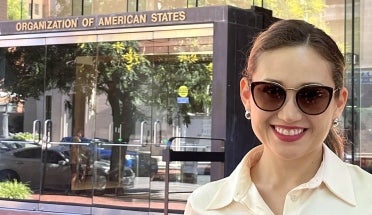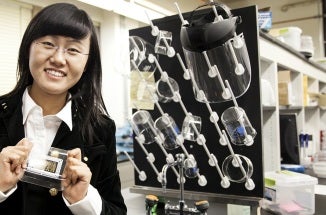
International Scholar Spotlight: Dr. Nanshu Lu
- Jan 28, 2015
- International Student and Scholar Services
- by Fiona Mazurenko
Austin is best known for live music, food trailers, and tech companies. It is also known for its unique culture and number of residents sporting a variety of tattoos, from small illustrations to large personal statements. Tattoo parlors dot the city map and the general tolerance of tattoos as a form of self-expression is part of what helps keep Austin the casual and creative place that attracts newcomers every day.
Austin is also known as the home to one of the world’s best universities, and it is here at The University of Texas at Austin that a researcher has developed a truly unusual tattoo that isn’t so much a personal statement as it is a revolution in modern healthcare.
Classified more accurately as an “epidermal electronic,” it resembles a temporary tattoo with intricate metal designs. It is applied directly to the skin and the metal designs are actually antennas that wirelessly transmit data like vital signs, brain activity, and indications of disease or movement disorders. The last step in the design, a chip that is self-powered, is still under development but coming soon.
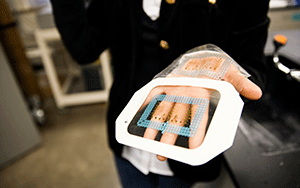
Just as interesting as the tattoo is the young scholar who created it.
Dr. Nanshu Lu, assistant professor in the Department of Aerospace Engineering and Engineering Mechanics at UT Austin, is a native of Chengdu in southwestern China. She completed her bachelor’s degree at Tsinghua University, a research university in Beijing widely regarded as the best in mainland China.
She immediately went on to pursue her Ph.D. at Harvard University. Though she’d never traveled to the U.S. before, culture shock wasn’t an issue for Lu. “I was so focused on my coursework and research that I didn’t have time to think about it,” she says. “I’m an only child so I think the shock for my parents was a lot more serious than mine.”
The research she did at Harvard, she says, was focused on very fundamental scientific work. She followed it with two-year post-doctoral fellowship at the University of Illinois Urbana-Champaign.
“In Illinois, I focused more on engineering, design, and testing, so I had very complementary training,” she explains. It’s that training and expertise that made her a desirable candidate for faculty positions across the country. Lu says she received four offers, but UT Austin was the best choice for her and she joined the faculty in 2011. “I chose UT Austin because of the mechanics team here,” she explains. “UT Austin is one of the very few places where engineering mechanics is still part of the department’s name and it’s one of the top mechanics programs in the US.”
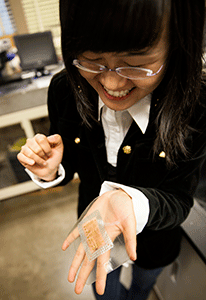 Of the three cities where she has spent the most time over the last ten years, she prefers Austin. “Austin is a really good combination of Boston and Champaign,” she says. “It has a really great balance.”
Of the three cities where she has spent the most time over the last ten years, she prefers Austin. “Austin is a really good combination of Boston and Champaign,” she says. “It has a really great balance.”
For Lu, there are two primary advantages to being at UT Austin in particular.
“First is the diversity of my colleagues. Whenever I need someone to help me, I can always find someone on this campus,” she explains. “Second is the entrepreneurial environment. I have learned so much from being at UT Austin, especially through the Longhorn Startup Lab where we give pitches and receive feedback from peers and potential investors. I feel that we are already in the circle of entrepreneurship of Austin and it’s a very fast growing city in terms of business and economics.”
Austin’s entrepreneurial culture is a great match for the young professor for whom entrepreneurship is a theme that runs deep. “I tell my students that we are entrepreneurs,” she says. “Entrepreneurs create a new product under extremely limited resources and with a lot of uncertainty. That is what we do.” That entrepreneurial spirit is also the driving force behind her goal to commercialize her tattoo in the near future, with the help of her husband, who is currently studying technology commercialization at McCombs School of Business.
Now at home in Austin, Lu continues to make a name for herself, and the epidermal electronic is really just a side product of her fundamental research. “After I came to UT, I wanted to prove that I can do independent work, I can bring in money, and I can produce papers,” Lu explains. “I have to say I’m very proud of myself, because I’ve only been here a little over three years, and I have already published 30 papers and brought in more than $1.3 million in funding.”
Among her other notable achievements are being named among MIT Technology Review’s 35 innovators under 35 and receiving the 3M Non-Tenured Faculty Award. But she is most proud of receiving the NSF CAREER Award last year. “It acknowledges my career work and my original idea,” she explains. “It’s the first time the community acknowledged me as a promising young investigator.”
Lu manages a team of eight students whose research focuses on the mechanics of flexible and stretchable electronics. “We do fundamental research on mechanics and we do this to serve the application of bio-integrated electronics,” Lu explains. “When we manufacture these devices, they often fail, because as we manipulate the materials, they break. So we have to understand why the break, why they fail, and come up with the best design to prevent that from happening.” The end goal is making sure they can design the best product possible.
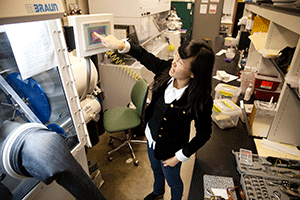
Many of the students on Lu’s team are from China, and Chinese students represent the largest international student population on campus totaling more than 1,200. “The biggest difference between academics here and in China is creativity and initiative from the students,” Lu says. “Here it’s the driving force for research, but in China – though it’s changing now – the advisor is the driving force. The advisors tell students everything and the students just have to follow.”
In addition to having passion and initiative, she believes her students must appreciate the importance collaboration and communication skills.
“I think my success has greatly benefited from collaboration, and that’s the idea I’m trying to give my students,” she says. “One person or one group cannot do it all. You have to know how to establish successful collaborative relationships.”
And to be successful, she says, you must be a good communicator. “I do good research but I am also good at giving presentations and communicating. I think that is why I’ve gotten where I am,” she says. “You can’t just have one skill, you have to have both, especially in the U.S.”
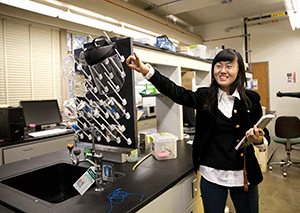 Lu has similar advice for all international students. “Practice English,” she says. “It is so important. I have seen so many talented international scholars with very strong publications and great track records score interviews but not get offers, and I think it’s because of their communication skills.”
Lu has similar advice for all international students. “Practice English,” she says. “It is so important. I have seen so many talented international scholars with very strong publications and great track records score interviews but not get offers, and I think it’s because of their communication skills.”
On the other hand, she encourages students struggling with English not to be too hard on themselves. “When I first came to the US, I was very frustrated because I couldn’t understand everything, “ she remembers.
She urges other prospective international students and scholars, especially those in engineering, to seriously consider UT Austin, “There are a lot of high profile schools that Asian students are all crazy about, but pursuing engineering at very small schools maybe isn’t the best choice,” she says. “UT offers very nice facilities and a lot of opportunities. Whatever you like about engineering, you can find it here.”
Texas Global strongly believes that international scholars, researchers, and faculty like Dr. Lu help make this university a world-class research institution and greatly benefit the entire university and community as a whole, proving every day that the tagline “what starts here changes the world” is true in multiple and profound ways, like an innovative twist on a temporary tattoo.

